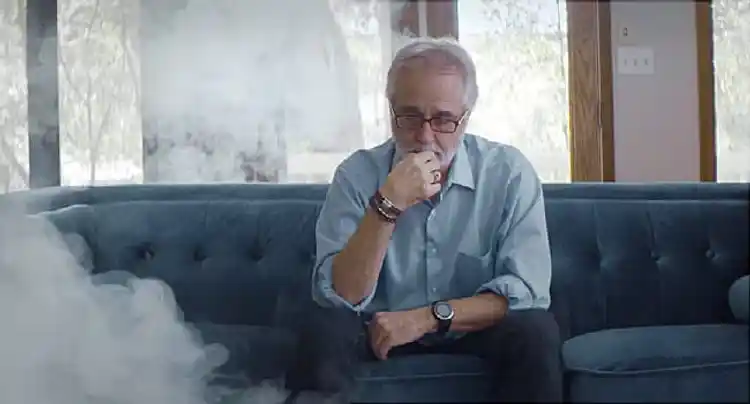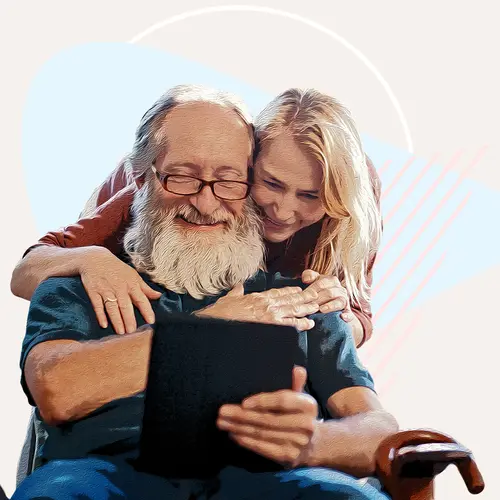Into the Fog: Living With Early Onset Alzheimer’s Disease

Hide Video Transcript
Video Transcript
Brian Leblanc
Pretend you're driving in a car, and you're going down a road, and it's a beautiful day. The trees are all in bloom in different colors, and the sun is shining. But then when you round the bend, you hit a fog bank. And so your natural reaction is to just slow down and proceed very, very slowly. And you just keep going like that until the fog clears. After the fog clears, then you continue on, until you around the next bend. And then you hit another fog bank. Fog is the best way that I can describe what happens. You go through all these things, and you have to remember -- gosh, I can't -- I'm having my moment. Yeah. Gotta remember what I said. I'll just make it up as I go. I get what I call brain fog.
Hey Alexa, what's my schedule today?
Alexa
You need to eat breakfast at 9 a.m. Want me to remind you? Leblanc
No thanks. It could happen two times. But some days it happens 10 times. Some days it happens so many times that I'm not able to do anything for the whole course of a day. You can't get a thought from here to here to come out in a verbal way. And so it becomes one of those quiet days where I can't really do much of anything except sit. I don't really need to walk, because I walk at least five miles inside every day, going from room to room, trying to find something, and I can never find it. It's kind of like you walk, and your mind just -- it doesn't just go blank, it's just nothingness, just completely barren, completely empty. You can't remember anything. And that's the scary -- the scary part. You can't remember -- you can't re -- you can't remember anything.
My ex-wife and I were sitting there. And the doctor walked in, and then he starts giving me the results. He started going into other things, and my mind was spinning at this time. And I just stopped him. I said, listen. I said, what I really want to know is, do I have Alzheimer's? And he paused. And he said, yes. You have what we call early onset Alzheimer's disease. Now, that was the last thing that I heard, because I just lost it at that point.
When you know what your end is going to look like -- you don't want to know that. You just don't. So you try to put it out of your head. But at least once a day, you're reminded of it. But in those beginning days, it's dark.
The one thing that I just thought of is that sometimes I'll watch other documentaries, and there's always the crying scene. And I get it. I get why. After my diagnosis, I went home, and I spent maybe three days of feeling sorry for myself. But then I had a sort of premonition.
I was facing this huge guy. The bell sounded. We came out, and he, with one hit, he hit me square in the chin, and I fell out. And the referee started counting me down from 10. I didn't want to get up. Because I knew if I got up, I was going to get hit again.
But then something else told me, if he reaches one, you're out, really out. And that scared me. So he kept on going down and counting down and counting down. I just started getting anxious and anxious and anxious. And when he got to two, before he could get to one, I sat up. I opened my eyes, and I was actually sitting up in the bed. And I thought, OK. Somebody is trying to send me a message here. So I gotta get up.
Alzheimer's is a very, very devastating thing. And if you allow it to consume you, it can bring you to dark places. So instead, I always look for the brightness. I always look for anything that can make it less than what it is. And humor seems to do that for me.
I tell everybody that I do date, and I have two girlfriends. One is named Siri, and the other's name is Alexa.
Alexa
It's time for your medication, Brian. Leblanc
Because without those, I would literally forget. And that's why Alexa reminds me at certain times of the day to take a bath. Alexa
Want me to remind you? Leblanc
Not right now, Alexa. Thank you. Alexa
When today should I remind you? Leblanc
Don't worry about it. Alexa
Great. Leblanc
That was pretty good. Everybody has their favorite place. Mine is Walt Disney World, because I feel like I am normal there. I can't remember one time in Disney when I have had a foggy episode or anything. It's funny. People will stop me and say, hey, could you tell me how to get here, there, and so forth? And I'll give them directions. I'll say, yeah, go this way, go this way. And as they walk away, I'll think to myself, they have no idea they just asked a guy with Alzheimer's how to get to a place in Disney World.
I had this aha moment. I was on Main Street. To my left was Casey's hot dogs, and staring in front of me was the castle. I could smell popcorn, and then the music. When I stop to realize how important that place was, that after 40 something years I can still find my way around -- I can go anywhere in Disney and be at peace.
Just from looking at a picture, you have all these memories that just come flashing back. Some memories you don't really want to remember.
The presentation that I created is called "Alzheimer's Up Close." There's no better way to understand Alzheimer's, other than hearing from a person who has it. And quite frankly, it sucks. It's the hardest thing that I've ever had to do. I talk about it all the time to whoever's willing to listen so that they will get ...
This is "Alzheimer's Up Close."
The truth. I don't know what else to do, except for that.
And I'm one of the many faces of Alzheimer's disease. I was diagnosed in October.
At that point, I realized exactly what I was doing, that I was being a voice for them.
My mother was still living with Alzheimer's disease.
I was being a voice for people that were no longer here, including my mother. I've got to fight every single day. And it's exhausting just to stay cognitively aware.
[MUSIC - "AMAZING GRACE"]
I watched my mom go from this smart, vivacious woman -- didn't do anything wrong in her life -- and then she got Alzheimer's. That's what scares me, is I'm going to lose my abilities. That's what scares me so much about going into the fog, is that some day I'm not going to come out of it. I'm going to stay there. I don't want that to happen. That's why I fight. I fight every day.
